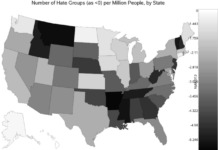By now, it’s common knowledge Russia penetrated several states’ voter rolls during the 2016 election.
Since then, concerns grew over the 2018 mid-term elections, which, according to intelligence data, were just as susceptible to foreign influence as before.
Especially disconcerting is the fact that House Republicans this summer refused to fund election security in a spending bill, all but ensuring another cyber attack.
As we await Special Counsel Robert Mueller’s report that began with an investigation into just how involved Russian operatives were in helping elect Donald Trump–and rivet ourselves to former Trump attorney Michael Cohen’s scathing testimony before the House Oversight Committee–a recent Washington Post report confirms U.S. Cyber Command successfully thwarted another hack attack.
Launching its “first offensive cyber campaign against Russia” on November 6–election day–U.S. Cyber Command was able to target and disable for the day the Kremlin-backed Internet Research Agency (IRA).
One official explained:
“Part of our objective is to throw a little curve ball, inject a little friction, sow confusion. We showed what’s in the realm of the possible. It’s not the old way of doing business anymore.”
The New York Times also reported on a messaging campaign zeroing in on IRA officials in Russia’s intelligence agency (GRU) involving emailing, direct messaging, and texting Russian trolls and hackers, informing them of our knowledge of what they were intending, warning them not to interfere with our elections or other countries’ affairs.
In 2017, Facebook presented Congress 3,000 Russian-purchased ads through 470 phony pages and accounts that suggest African American rights groups, like Black Lives Matter, posed a political threat, in an effort to exploit racial divisions. Facebook said at least $100,000 was spent for this purpose, a mere fraction of its political advertising during the 2016 campaign.
Exploiting Facebook’s ability to send conflicting messages to users based on their political and demographic characteristics, the Russian cyber endeavors also intended to create a rift among religious groups, such as emphasizing Muslim women’s support for Hillary Clinton.
In December, the New York Times reported the IRA’s, exploitation of social media platforms was far more extensive than initially assumed.
Russian trolls promulgated disinformation and division on basically all the social media millions of people engage with every day–Twitter, YouTube, Reddit, Tumblr, Pinterest, Vine, Google+, and particularly Instagram.
According to reports to the U.S. Senate Intelligence Committee, Russia engaged in a five-year “propaganda war” against the U.S. public. Oxford researchers responsible for one of the reports said this propaganda was intended to “push and pull” Americans in different directions.
It goes on to confirm what we already suspected:
“What is clear is that all of the messaging clearly sought to benefit the Republican party – and specifically, Donald Trump.”
A major component to the report cites Russia “extensively” and “specifically” targeted Black Americans.
Both reports fault the social media organizations’ executives, who “misrepresented or evaded” and “dissembled” during their statements to Congress.
The Times reports:
“While the right-wing pages promoted Mr. Trump’s candidacy, the left-wing pages scorned Mrs. Clinton while promoting Senator Bernie Sanders of Vermont and Jill Stein, the Green Party candidate. The voter suppression effort was focused particularly on Sanders supporters and African-Americans, urging them to shun Mrs. Clinton in the general election and either vote for Ms. Stein or stay home.”
Moreover, the Washington Post reported that in January 2017, having achieved its goal of placing Donald Trump in the White House, the Russian disinformation campaign then turned its attention to discrediting Robert S. Mueller III, the special counsel charged with investigating Russian interference in the 2016 election.
Through artificial accounts like ones familiar to most social media users, operatives claimed Mueller was corrupt and alleged Russian interference was a ludicrous conspiracy theory.
Malcolm Nance, retired Central Intelligence Agency (CIA) and National Security Agency (NSA) agent, counter-intelligence expert, and author of the books The Plot to Hack America: How Putin’s Cyberspies and WikiLeaks Tried to Steal the 2016 Election and The Plot to Destroy Democracy: How Putin and His Spies Are Undermining America and Dismantling the West, said about the recent revelations on MSNBC:
“When I wrote my first book on this just about six weeks before the election I estimated that the Internet Research Agency which we called an information warfare management cell could have between 300 and 1,000 people. Now that looks minuscule compared to the integrated way that they used and weaponized every social media platform that America had, all of the big ones, and then took freedom of speech itself, the thing that we cherish the most, and used it to shove their narrative of what they wanted the American public to see.
They ran racial groups against each other. They pit political groups against each other and they pushed one candidate while tearing down the other. All I can say is this. As an intelligence professional, none of this happens in a year or two years. This effort began at least three to five years before and they had to have known who they were going to be dealing with and that’s how we saw as early as 2012 the Russians had contact with Donald Trump related to his election and that — six years seems better timeline to come up with all of the information that’s in these reports.”
The fact we protected the recent mid-term elections from the same nefarious foreign shenanigans responsible for tainting 2016 is, of course, good news.
However, let’s also consider the reality that Russia–and other foreign cybercriminals–are not going to stop just because we foiled them this time.
Our objective to “throw a little curve ball, inject a little friction, sow confusion” is precisely Russia’s motives against us.
Foreign operatives are not going to stop attempting to poison our electoral infrastructure simply because we prevented them from doing so this time.
To quote former FBI director James Comey when testifying before Congress in June 2017 regarding his dubious firing, “They will be back.”
Besides, who need Russian internet trolls or anyone else when we have our own Republican party, the party of voter suppression, aka election fraud.
Good for us for stepping up our vigilance against nefarious foreign actors.
But let’s not lose sight of invidious players right here within our own gates.
Image credit: Department of Defense – Defense.gov





